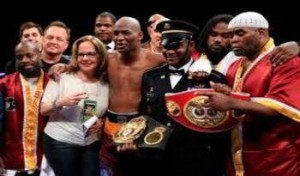 Bernard Hopkins (55-7-2, 32 KO’s) has been an astute, subtle operator throughout his 27-year professional career and his recurring attempts to accomplish the improbable have been motivated by a desire to establish his legacy.
Bernard Hopkins (55-7-2, 32 KO’s) has been an astute, subtle operator throughout his 27-year professional career and his recurring attempts to accomplish the improbable have been motivated by a desire to establish his legacy.
He lost his first professional fight before going undefeated for five years until he met a young Roy Jones Jr in 1993. The next mark on his ‘L’ column didn’t come until another twelve years had passed, in which time he racked up a record twenty defences of his IBF middleweight title and unified the entire division.
He went on to light-heavyweight glory after losing out to Jermain Taylor in 2005 and until last year held three of the four belts in that division too, at 49 years old.
Continually he has not only fought but sought the toughest assignments available, more so after his 40th birthday; Taylor twice, Joe Calzaghe, an undefeated Kelly Pavlik, Jean Pascal twice, Chad Dawson twice, and just last November Sergey Kovalev.
He won some; he lost some, but he rolled the dice on every one in an attempt to be remembered, revered even, once his time is through.
In a recent interview with Fighthype.com Hopkins was asked whether the current crop of middleweights are scared to take on those, tough, dangerous assignments he has been celebrated for accepting.
The current cream of the 160 lb. division is made up of four individual champions: Gennady Golovkin (WBA Super) and David Lemieux (IBF) -who are meeting this October for a unification fight- Andy Lee (WBO) and Miguel Cotto (WBC).
Golovkin and Lemieux are both taking a gamble by facing one and other, as is Cotto by defending his belt against Saul ‘Canelo’ Alvarez this November. Andy Lee doesn’t have it easy either by putting his title up against a young southpaw in Billy Joe Saunders.
Based on this Hopkins appeared to be on point when he said;
“I think most fighters, over ninety percent, will fight whoever they have to fight if they have to fight.”
Fans have been disgruntled with this division for a while with all the champions appearing to stay out of one and others way until very recently.
In fact, the last man to unify the belts was Hopkins, who feels that short-term financial gain has dislodged legacy as the number one priority for the young fighters of today.
“Today’s mentality of a young guy, most, but not all, most, they would take more of the upside of the money, more than what his career and what fights are meaningful or not. And that’s the trickery of the uneducated and those that don’t know about the business of the business, and they will take that bait until that bait is no longer there for them to take, and then they gotta find out what they gonna do.”
Ascertaining a fighter’s true purse is a difficult thing to do when you are not privy to their personal accounts, but you would have to assume that all the top-level talent are being well paid to varying degrees. If a big green cushion stays under your backside no matter who you fight, there is little incentive to take on a ‘fifty-fifty’ and maybe blemish your record, hence damaging potential future earnings.
You would be hard-pressed to look through any of the champions’ resumes and see an extended run of fights where they were in real danger every time.
But then, the truly big fights like Cotto vs. Canelo will guarantee both participants huge amounts of cash. Numbers like 30 million for Cotto and 10 for Canelo are being bandied about for their meeting. Which begs the question; would they be fighting if it wasn’t worth their while, given their past earnings? Probably not.
The money will always be a huge driving force for a fighter and his handlers that decide who they decide to take on, the risk and the reward. Many, like Hopkins, have elevated their standing from nothing by lacing up the gloves and trading punches for the baying crowds. Surely the pursuit for ever-increasing purses would become almost an intoxicating as glory under the bright lights.
Money and glory cannot be separated entirely, but for Hopkins, when the former takes precedence over the latter, it’s a problem not only for the for the fighter but for the fans, too.




